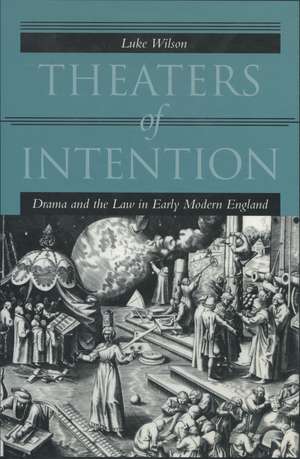Theaters of Intention: Drama and the Law in Early Modern England
Autor Luke Wilsonen Limba Engleză Hardback – 30 noi 2000
Early modern Britain witnessed a transformation in legal reasoning about human volition and intentional action, which contributed to new conventions and techniques for the theatrical representation of premeditated conduct. Theaters of Intention examines the relation between law and theater in this period, reading plays by Shakespeare, Jonson, Marlowe, and others to demonstrate how legal understanding of willful human action pervades sixteenth- and seventeenth-century English drama.
Drawing on case law, legal treatises, parliamentary journals, and theatrical account books, the author considers the interplay between theatrical deliberation and legal dramatization of human intention. He analyzes such canonical plays as Hamlet, Timon of Athens, Dr. Faustus, Bartholomew Fair, and Othello alongside less familiar texts, including Barnes's The Devil's Charter, Jonson's Entertainment at Althorp, and the anonymous Nobody and Somebody.
Notable instances of the new theatrical representation of premeditated conduct include the appearance in Hamlet of wording from the sensational case of Hales versus Petit and dramatizations of contract law in enactments of demonic pacts in the plays of Marlowe and Barnes. The final chapter examines the iconography of Nobody, an early modern equivalent of John Doe, and features some dozen illustrations of contemporary woodcuts, drawings, and engravings.
Tied closely to the convergence of authorial and dramatic forethought, theatrical representation of premeditated action demonstrates the close relationships among purposeful human behavior, fictionality, economic exchange, and the experience of time.
Drawing on case law, legal treatises, parliamentary journals, and theatrical account books, the author considers the interplay between theatrical deliberation and legal dramatization of human intention. He analyzes such canonical plays as Hamlet, Timon of Athens, Dr. Faustus, Bartholomew Fair, and Othello alongside less familiar texts, including Barnes's The Devil's Charter, Jonson's Entertainment at Althorp, and the anonymous Nobody and Somebody.
Notable instances of the new theatrical representation of premeditated conduct include the appearance in Hamlet of wording from the sensational case of Hales versus Petit and dramatizations of contract law in enactments of demonic pacts in the plays of Marlowe and Barnes. The final chapter examines the iconography of Nobody, an early modern equivalent of John Doe, and features some dozen illustrations of contemporary woodcuts, drawings, and engravings.
Tied closely to the convergence of authorial and dramatic forethought, theatrical representation of premeditated action demonstrates the close relationships among purposeful human behavior, fictionality, economic exchange, and the experience of time.
Preț: 511.53 lei
Preț vechi: 631.51 lei
-19% Nou
Puncte Express: 767
Preț estimativ în valută:
97.88€ • 102.47$ • 80.99£
97.88€ • 102.47$ • 80.99£
Carte tipărită la comandă
Livrare economică 05-19 aprilie
Preluare comenzi: 021 569.72.76
Specificații
ISBN-13: 9780804734141
ISBN-10: 0804734143
Pagini: 368
Ilustrații: 13 figures
Dimensiuni: 152 x 229 x 28 mm
Greutate: 0.72 kg
Ediția:1
Editura: Stanford University Press
Colecția Stanford University Press
ISBN-10: 0804734143
Pagini: 368
Ilustrații: 13 figures
Dimensiuni: 152 x 229 x 28 mm
Greutate: 0.72 kg
Ediția:1
Editura: Stanford University Press
Colecția Stanford University Press
Recenzii
"Theaters of Intention is . . . an original and provocative study. It manages to range across a considerable amount of often dense legalistic and literary material, but does so in a way that maintains a reasonable degree of accessibility for the non-specialist. The lawyer will learn much about early modern literature, whilst the literary scholar will find much of interest regarding the exercise of law. Above all, it adds further weight to the thesis that it is impossible to study either law or literature in early modern England without due consideration of both."—English Studies
"Rather than surveying the representation of law in plays, or even theater legislation, Wilson tracks the way legal changes—critically in the area of contracts and contract law—both express and create new understandings of the nature of intention and action, fundamental categories of the legal, political, and psychological subject. . . . Throughout Theaters of Intention, Wilson juxtaposes the law and the stage in provocative and productive ways, and captures the culture's anxious efforts to come to grips with its own emerging, slippery identities."—Studies in English Literature
"Wilson's tracing of legal sources for ideas, situations, and vocabulary concerning intention and agency in the drama texts he studies is convincing. . . . The original contribution here is in the depth and detail of Wilson's readings of these few plays and his elaboration of the complexity of the issues of intention they dramatize."—Renaissance Quarterly
"This is a learned, densely researched, and above all weighty book. Scholars of Renaissance drama will want to come to terms with it, and draw upon the wealth of information it contains. Many critics have attempted to relate English Renaissance drama to contemporaneous legal developments, but Luke Wilson really delves into the subject and displays an intimate knowledge of the arcana of that most arcane of all subjects—English common law."—Ben Jonson Journal
"This is a provocative book, one that may well repay repeated consulatation."—Seventeenth-Century News
Notă biografică
Luke Wilson is Associate Professor of English at Ohio State University.
Textul de pe ultima copertă
“Theaters of Intention is . . . an original and provocative study. It manages to range across a considerable amount of often dense legalistic and literary material, but does so in a way that maintains a reasonable degree of accessibility for the non-specialist. The lawyer will learn much about early modern literature, whilst the literary scholar will find much of interest regarding the exercise of law. Above all, it adds further weight to the thesis that it is impossible to study either law or literature in early modern England without due consideration of both.”—English Studies
“Rather than surveying the representation of law in plays, or even theater legislation, Wilson tracks the way legal changes—critically in the area of contracts and contract law—both express and create new understandings of the nature of intention and action, fundamental categories of the legal, political, and psychological subject. . . . Throughout Theaters of Intention, Wilson juxtaposes the law and the stage in provocative and productive ways, and captures the culture’s anxious efforts to come to grips with its own emerging, slippery identities.”—Studies in English Literature
“Rather than surveying the representation of law in plays, or even theater legislation, Wilson tracks the way legal changes—critically in the area of contracts and contract law—both express and create new understandings of the nature of intention and action, fundamental categories of the legal, political, and psychological subject. . . . Throughout Theaters of Intention, Wilson juxtaposes the law and the stage in provocative and productive ways, and captures the culture’s anxious efforts to come to grips with its own emerging, slippery identities.”—Studies in English Literature
Descriere
Early modern Britain witnessed a transformation in legal reasoning about human volition and intentional action. Examining the relation between law and theater in this period, this book reads plays by Shakespeare, Jonson, Marlowe, and others to demonstrate how legal understanding of willful human action pervades 16th- and 17th-century English drama.











